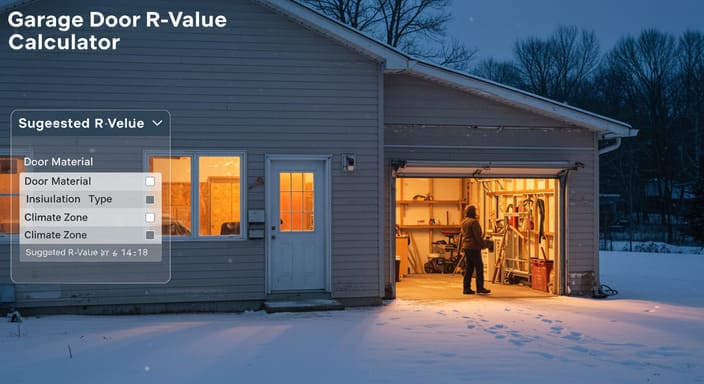Whatsapp At : +1 817 254 2207
Garage Door R Value Calculator

Garage Door R-Value Calculator
Calculate the ideal insulation value for your garage door based on climate, usage, and construction to maximize energy efficiency and comfort
Calculate Your Ideal R-Value
Recommendation
Based on your inputs, we recommend:
A well-insulated door for your climate and usage
Why this value? This R-value balances energy efficiency with cost-effectiveness for your specific situation.
Material suggestion: Consider polyurethane-insulated doors for maximum efficiency.
Understanding R-Value
What is R-Value?
R-value measures thermal resistance - how well a material resists heat flow. Higher R-values mean better insulation. For garage doors, this affects energy efficiency and comfort.
Climate Zone Recommendations
Your location significantly impacts the ideal R-value for your garage door:
Zones 1-3
Warmer Climates
R-6 to R-9
Zones 4-5
Mixed Climates
R-9 to R-12
Zones 6-8
Colder Climates
R-12+
Material Comparison
Different garage door materials offer varying insulation properties:
| Material Type | Typical R-Value | Insulation Quality |
|---|---|---|
| Non-Insulated | R-0 | Poor |
| Single-Layer Steel | R-1 to R-3 | Basic |
| Double-Layer w/ Polystyrene | R-4 to R-7 | Moderate |
| Triple-Layer w/ Polyurethane | R-8 to R-12 | Good |
| Premium Insulated | R-12 to R-20+ | Excellent |
Energy Saving Tips
Weather Sealing
Proper weatherstripping can improve efficiency by up to 20% regardless of R-value.
Window Placement
Limit window area to reduce heat transfer. Use double-paned glass if possible.
Professional Installation
Proper installation ensures maximum efficiency from your insulated door.

What Is a Garage Door R-Value Calculator?
A garage door R-value calculator is a simple tool that helps you understand how well your garage door is insulated. The R-value measures how much the door can resist heat flow. A higher R-value means better insulation, which keeps your garage warm in winter and cool in summer.
This calculator uses your garage door’s dimensions, material, and insulation type to give an accurate R-value score. It also helps you see if your current garage door meets modern insulation standards. If your door has a low R-value, the tool can suggest whether upgrading to a better-insulated garage door could save energy and lower utility bills.
Using a garage door R-value calculator can also help improve comfort in rooms attached to your garage. It’s a quick way to check if your door is energy-efficient, especially if you live in areas with extreme temperatures.
Why Is R-Value Important for Garage Doors?
The R-value is crucial because it directly affects your home’s energy performance. A poorly insulated garage door allows heat to escape during winter and lets heat enter during summer. This makes your heating and cooling systems work harder, which leads to higher energy costs.
By choosing a garage door with the right R-value, you can:
- Reduce heat loss and maintain stable indoor temperatures.
- Lower monthly energy bills by improving efficiency.
- Prevent drafts and moisture from entering your garage.
- Reduce outside noise and create a quieter indoor space.
An R-value calculator makes it easy to compare different doors and pick the one that best suits your needs. For homeowners with attached garages, having a well-insulated garage door is one of the easiest ways to save energy and protect your home from extreme weather.
How the Garage Door R-Value Calculator Works
A garage door R-value calculator uses simple inputs to give accurate insulation ratings. It combines your door’s specifications with standard thermal performance formulas to estimate energy efficiency.
Inputs Needed:
- Garage door dimensions: The height and width determine total surface area and heat transfer.
- Panel material: Steel, wood, or fiberglass panels have different insulation levels.
- Core insulation type: Polystyrene, polyurethane, or no insulation significantly changes the R-value.
- Panel thickness: Thicker panels usually mean better thermal resistance.
- Climate zone or zip code: Helps the tool recommend R-values based on your local weather conditions.
Output Provided:
- Calculated R-value: Shows the current insulation performance of your garage door.
- Recommended R-values: Based on climate and energy-saving goals.
- Energy savings estimate: Predicts how much you could save on heating and cooling by upgrading.
In just a few clicks, this calculator gives homeowners a clear picture of their garage door’s insulation level. It also helps compare different door options, ensuring you invest in the right energy-efficient solution.
R-Value Ratings for Garage Doors by Type
Garage doors come in different materials and designs, and each offers varying levels of insulation:
Non-Insulated Garage Doors (R-value ~0–1):
These doors offer almost no thermal resistance. They are best for detached garages or areas where energy efficiency is not a concern.
Single Layer Insulated Doors (Polystyrene) (R-value 4–6):
Affordable and basic, these doors provide a small insulation boost for mild climates.
Double Layer Insulated Doors (Polyurethane) (R-value 9–12):
These doors provide better energy savings and durability. Polyurethane foam fills gaps completely, reducing heat loss.
Triple Layer Premium Doors (R-value 12–20+):
Designed for extreme climates, these doors have maximum insulation, helping maintain consistent indoor temperatures.
Choosing the right R-value ensures better energy efficiency, improved comfort, and lower utility costs over time.
Factors That Influence R-Value and Energy Efficiency
The R-value of a garage door depends on several factors that affect its insulation performance and overall energy efficiency. Understanding these factors helps you choose the right door and maintain its effectiveness over time.
- Material Density and Thickness:
Thicker materials like steel with dense insulation provide higher R-values. Polyurethane insulation is more effective than polystyrene because it bonds tightly within the door panels. - Panel Construction:
Garage doors come in single, double, or triple-layer designs. Triple-layer doors with insulation sandwiched between steel or aluminum panels offer the best thermal resistance. - Seals and Weatherstripping:
Even the highest R-value door can lose efficiency if weatherstripping is worn out or gaps are present. Quality seals prevent air leaks and improve energy savings. - Garage Door Windows:
Windows reduce overall insulation because glass transmits heat more easily than insulated panels. Double-glazed or low-E windows can help reduce energy loss. - Installation Quality and Maintenance:
A poorly installed garage door will not perform to its rated R-value. Regular maintenance, like checking seals and tightening hardware, ensures consistent energy efficiency.
A garage door R-value calculator evaluates all these elements, providing accurate insights into thermal resistance and energy-saving potential.
Ideal R-Value Based on Climate and Usage
Choosing the correct R-value depends on your location and how you use your garage:
- Mild Climates (R-value 4–6): Suitable for detached garages or spaces with minimal temperature concerns.
- Cold Climates (R-value 12–16): Best for attached garages where heat loss affects indoor comfort.
- Extreme Temperatures (R-value 16–20+): Ideal for heated or cooled garages, workshops, or garages that double as living spaces.
If your garage is used for hobbies, a gym, or storage of temperature-sensitive items, a higher R-value door will maintain consistent indoor conditions and reduce energy costs.
Garage Door R-Value vs. U-Factor Explained
When evaluating garage door insulation, R-value and U-factor are two key metrics that indicate energy efficiency, but they work in opposite ways.
R-Value:
- Measures a material’s resistance to heat flow.
- A higher R-value means better insulation and reduced heat transfer.
- Most insulated garage doors range between R-4 and R-20, depending on construction and material.
U-Factor:
- Measures the rate of heat transfer through the door.
- A lower U-factor indicates better thermal performance.
- While R-value shows how well a door blocks heat, U-factor reveals how much heat escapes.
Why Both Matter:
Some garage door calculators display both metrics to give a complete energy efficiency picture. While R-value is commonly used in residential garage doors, U-factor is often considered in commercial projects or when comparing doors with windows.
Understanding both ratings helps homeowners choose the right balance of insulation and cost-effectiveness for their climate and garage usage.
DIY vs. Professional Insulation Upgrades
Improving your garage door’s insulation can significantly boost its R-value. There are two main approaches:
DIY Insulation:
- You can use insulation kits made of foam boards or reflective materials.
- A DIY kit can raise the R-value by 2–5 points.
- It’s affordable but less effective than a factory-insulated door.
- Requires careful installation to avoid gaps or poor sealing.
Professional Upgrade:
- A replacement garage door with built-in polyurethane insulation can achieve R-values up to 20 or higher.
- Offers better sealing, durability, and long-term energy savings.
- Professional installation ensures proper fit and maximum thermal efficiency.
For those with heated or air-conditioned garages, a professional upgrade often pays for itself through reduced energy costs.
FAQs: Garage Door R-Value Calculator
Q1: What R-value is considered energy-efficient for a garage door?
For attached garages or garages connected to living spaces, an R-value above 9 is considered energy-efficient. If you live in colder climates, a higher R-value (12–16 or more) is recommended to prevent heat loss and lower energy bills.
Q2: Can I calculate the R-value for an existing garage door?
Yes. By entering the door’s thickness, construction material, and insulation type (such as polyurethane or polystyrene), a garage door R-value calculator can estimate its insulation performance. This helps determine if adding insulation or replacing the door is worthwhile.
Q3: Does adding windows lower R-value?
Yes. Standard glass panels reduce a door’s overall R-value because glass allows more heat transfer than insulated panels. Opting for insulated or double-pane windows can minimize this impact while still allowing natural light.
Final Thoughts: Boost Comfort and Energy Savings
A garage door R-value calculator is a practical tool for homeowners looking to enhance energy efficiency, comfort, and savings. By understanding your garage door’s insulation level, you can choose the right upgrades, reduce heating and cooling costs, and maintain consistent indoor temperatures. Whether you’re adding insulation or selecting a new energy-efficient door, knowing the R-value ensures long-term durability, improved comfort, and smarter energy use.

